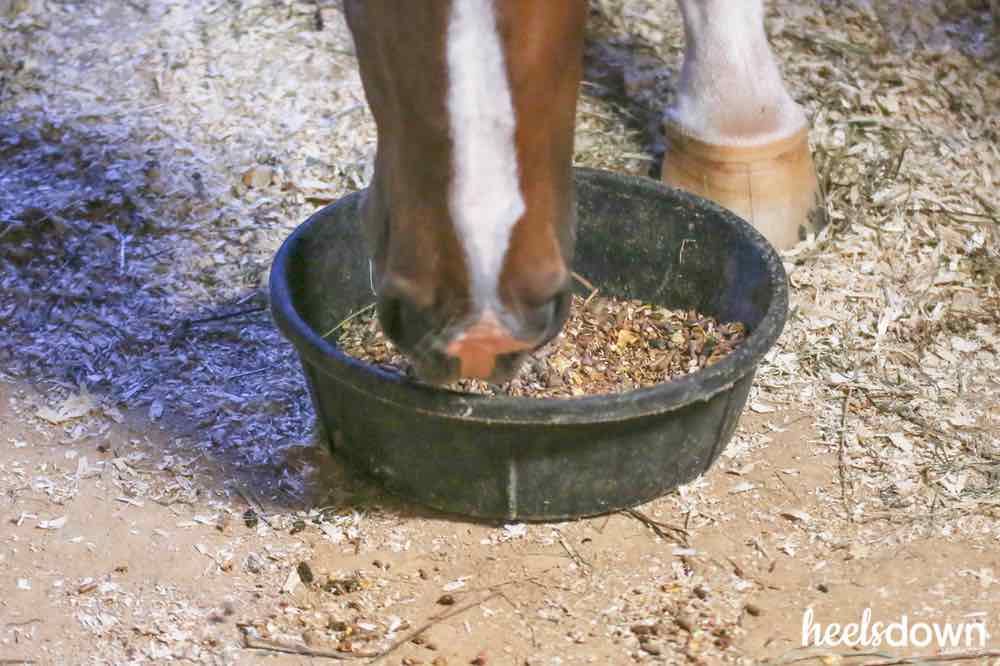Am I Over-Supplementing My Horse?

By Justine Griffin
Joint. Hoof. Coat. Digestive aid. Weight gain. Calming. Energy. Recovery. You name it, there’s a supplement for that.
Horse owners spend hundreds of dollars a month on supplements for their animals, especially if their horses have a specific deficiency or compete regularly and at strenuous levels. But how do we know if these supplements are really aiding our horses? Most of the time we don’t. And not to burst your bubble, but equine nutritionists agree that there’s a severe lack of scientific research out there to prove whether most these supplements actually help our horses.
“More often than not, there’s not good evidence out there to back up the claims that supplements do what they say they do,” said Lori Warren, an equine nutritionist with the University of Florida in Gainesville, Fla.
Some studies show that there are properties in a couple of supplements, like those formulated to help hooves and joints, that can aid some horses but not others. Overall, the science is limited, said Kathleen Crandell, an equine nutritionist with Kentucky Equine Research in Versailles, Ky.
“Whether they’re backed up by research is questionable. It’s dependent on the company and the integrity of that company,” Kathleen explained. “Some companies will fund research at universities, but it can be quite expensive. They’re not necessarily motivated to do research if their supplement is already on the shelves and people are buying it.”
Less regulated than drugs
The supplement industry isn’t regulated the same way drugs are, even though both are overseen by the Food and Drug Administration in the U.S.. However, consumers can file complaints about adverse effects of supplements to the FDA, which can open specific cases against a company or a product.
Often times there are properties in supplements that are good for horses, like biotin for hooves, but the amount needed to make a difference is much greater than what’s usually found in one supplement tub. Same goes for electrolytes. Plain salt is a great aid for working horses, especially in hot and humid conditions, but most commercial supplements have more sugar and other unecessary properties in them than salt, Lori said.
A well-balanced diet of grain and high quality hay and grass is what we know works.
A good rule of thumb is to add a supplement if your horse has a specific problem. Biotin won’t help horses hooves grow faster or stronger if they don’t have brittle or soft hooves to begin with, Kathleen explained. While some consumers use joint supplements as a preventative measure, it’s hard to say whether or not it actually helps the animal in the long run.

“We think of human athletes, like people who run triathlons, and try to apply what works for them to our athletic horses, which isn’t the same thing,” Lori described. “Basically you’ve got a big vegetarian, and if they’re being fed a high quality diet, they’re probably not lacking a lot in terms of being able to repair muscle tissue after exercise all on their own.”
Look at the horse’s diet first
So horse owners should focus on their horses’ core diet, like balanced grain and forage, before considering supplements that may or may not be a waste of money.
“We have the best knowledge about feeding and supporting the body and its tissues through the routine nutrients a horse needs,” Lori explained. “That comes from feed, where we can monitor calorie intake, protein levels, vitamins and minerals. A well-balanced diet of grain and high quality hay and grass is what we know works. Everything else, you’re gambling if they do or don’t do what they say.”
Nutritionists say consumers should be critical of any product they consider to feed their horse. Try it for 30 days and if you don’t see results, it probably means it’s not having an effect on your horse.
“Supplements will be absorbed, for the most part, even if they don’t need them. But they’ll pee out whatever extra the body won’t use,” Lori said. “But there are elements of supplements that we just don’t know if they absorb, like glucosamine. It’s complicated and we should remember we can do damage.”


